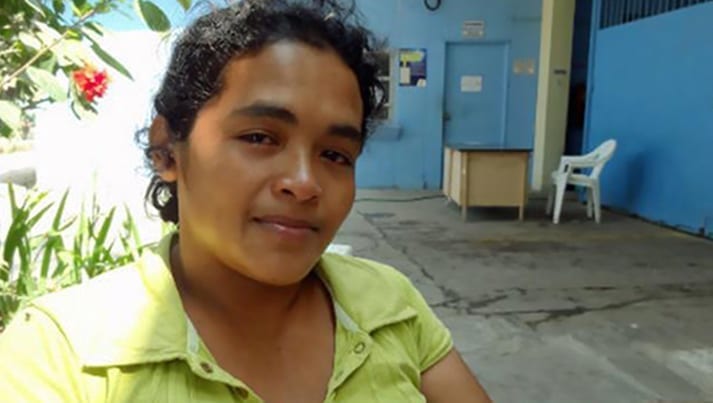Inter-American Court of Human Rights Hears Case of Salvadoran Woman Imprisoned After Obstetric Emergency
Inter-American Court of Human Rights Hears Case of Salvadoran Woman Imprisoned After Obstetric Emergency
Today, the Inter-American Court of Human Rights heard arguments in Manuela v. El Salvador–a case that seeks reparations on behalf of the family of Manuela, a mother of two with limited means who in 2008 was unjustly detained, shackled and interrogated without the presence of a lawyer and later sentenced to 30 years in prison for aggravated homicide after suffering an obstetric emergency that resulted in her pregnancy loss. She died two years into her sentence, from cancer, having received inadequate medical diagnosis and treatment.
The Center for Reproductive Rights and the Colectiva Feminista para el Desarrollo Local, with the support of the Agrupación Ciudadana por la Despenalización del Aborto, have asked the Court to issue a ruling on behalf of Manuela’s family so the Salvadoran State can take public responsibility for not guaranteeing her right to life and health and to compensate her family for their loss and suffering.
With this case, the Court—for the first time–will have the opportunity to recognize how the absolute denial and criminalization of reproductive health services in El Salvador discriminates against and causes violence against women who suffer obstetric emergencies, denying them due process.
“While other countries have removed barriers to sexual and reproductive health and rights, El Salvador continues to violate these human rights,” said Nancy Northup, president and CEO of the Center for Reproductive Rights. “We brought this case to the Inter-American Court of Human Rights to ensure that international standards prevail, and El Salvador and other nations stop this stigmatizing and discriminatory prosecution of innocent women. Women and girls must have the necessary legal guarantees to reproductive autonomy and access reproductive health services.”
With its total ban on abortion, El Salvador imposes harsh criminal penalties on women and physicians, resulting in the unjust imprisonment of countless women following pregnancy-related complications and loss. Over the last two decades, roughly 181 women who experienced obstetric emergencies were prosecuted for abortion or aggravated homicide.
“Manuela was the victim of a State that does not protect the life and health of women, that discriminates and criminalizes them for having natural complications of pregnancy and does not provide guarantees to protect the confidentiality between medical staff and patients,” said Catalina Martínez Coral, regional director for Latin America and the Caribbean at the Center for Reproductive Rights. “We want El Salvador to assume the international responsibility it has evaded for years to review the legislation that causes this unjust criminalization of women.”
“I remember my mom, she gave us advice and never let us alone. It is painful to grow up without a mother because that love is incomparable. I ask the State not to do these things because they left us abandoned without a mother,” said Santos de Jesús, Manuela’s eldest son.
The Center and its partner organizations are asking the Court to direct El Salvador to establish public policies to ensure that this kind of discriminatory prosecution of women like Manuela ends; arguing for an urgent review of the sentencing of women criminalized for obstetric emergencies; calling for legislative measures to adequately regulate the Health Code so that the treatment of obstetric emergencies by medical personnel does not give rise to criminal liability; and seeking reforms of the deficiencies of the criminal and prison system, among others. The organizations bringing this case are also asking the court to recognize that:
- A total ban on abortion further develops a culture of systemic discrimination and gender-based violence, as it disproportionately impacts women in vulnerable situations and encourages the criminalization of their reproductive processes.
- The current mandatory reporting of obstetric emergencies by health care professionals to the police and judicial authorities is a violation of their right to privacy and health.
- The practice of detaining and handcuffing women while they are receiving emergency obstetric care constitutes torture, and violates the presumption of innocence.
- The presumption that the life of the fetus always trumps the well-being of a woman experiencing an obstetric emergency is a form of gender-based discrimination and these kind of stigmatizing stereotypes present barriers to women seeking health care in an emergency.
The Court’s decision, due sometime this year, is expected to resonate throughout the region, not just in El Salvador. The jurisdiction of the international tribunal generates jurisprudence that becomes part of the Inter-American Human Rights System, which is recognized and followed by most countries in Latin America and the Caribbean, including El Salvador, which signed on to the agreement in 1995.
“Manuela’s story is a sad story but represents a change and becomes a path of justice and hope for all women in Latin America and the Caribbean who are criminalized for obstetric events,” said Morena Herrera, representative of the Colectiva Feminista para el Desarrollo Local.
###
PRESS CONTACT: [email protected]

